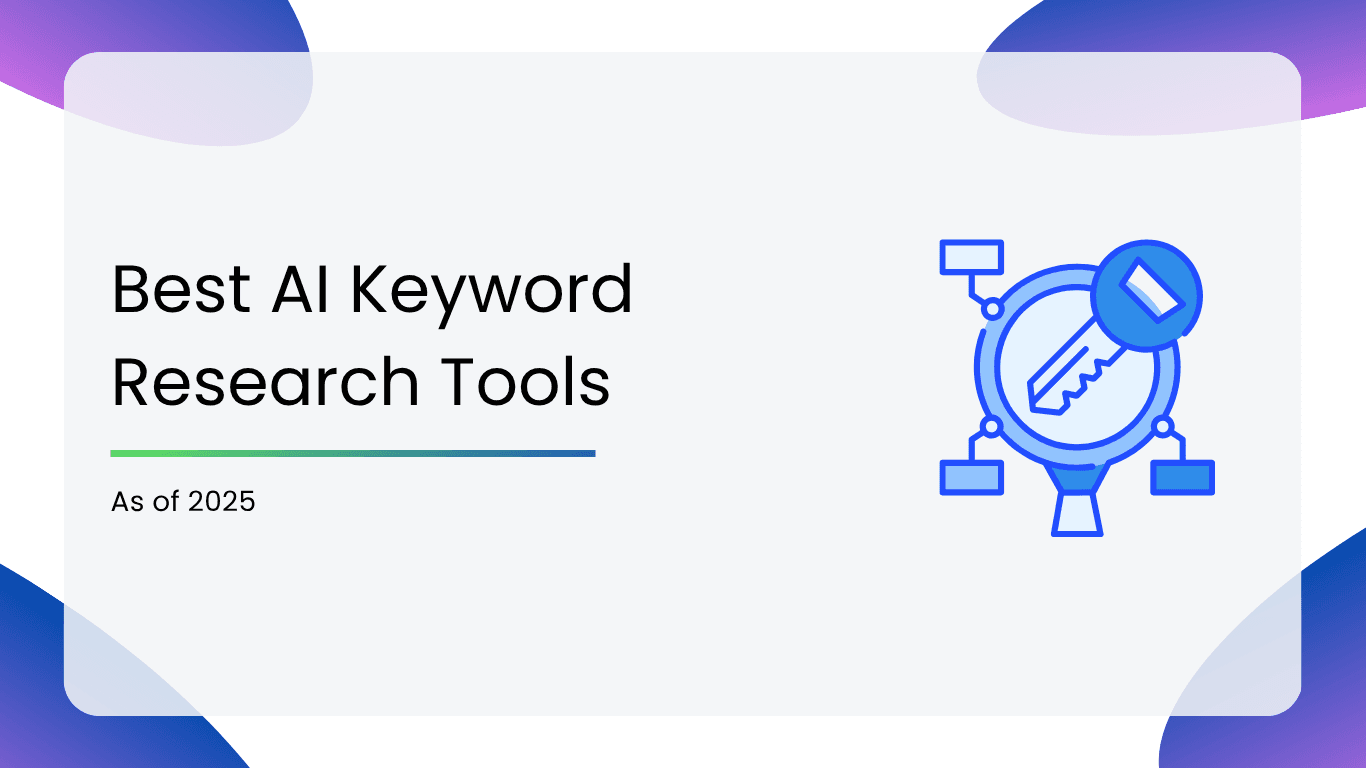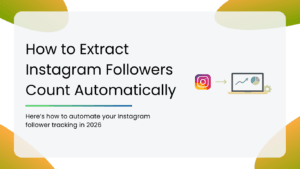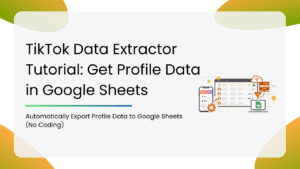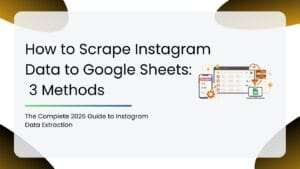With the changing world of online marketing, keeping up with SEO trends is extremely important, and it begins with effective keyword research. Outdated technology is still relevant, but artificial intelligence-driven keyword research tools are revolutionising how marketers determine search intent, organise keywords, and produce optimised content at scale. These AI tools use machine learning and natural language processing to learn about search engine results, forecast performance, and optimise content strategy.
This guide covers the top AI keyword research tools of 2025. It is intended for SEO agencies, PPC experts, and beginner bloggers. These tools will enable you to attain more organic traffic and make content choices with data at ease.
Benefits of Using AI Keyword Research Tools
- Saving Time: AI technology quickly scans huge amounts of information, providing the best keywords in seconds rather than hours of tedious research.
- Improved Keyword Suggestions: Instead of just listing keywords by volume, AI technology can identify context, user intention, and semantic significance, offering more discerning long-tail keyword recommendations that actually convert.
- Competitor and SERP Insights: Most AI keyword tools draw data straight from search engine results pages (SERP’s). They show you what’s ranking and why.
- Improved Content Planning: AI tools tend to extend beyond the discovery of keywords, with clustering, topic suggestions, and even AI-created content briefs-simplifying the entire content creation process.
Common Challenges with AI Keyword Research Tools
- Limited Data Accuracy for New/Niche Keywords: AI tools tend to have outdated or generalised information about upcoming trends or specialised markets, leading to low-accuracy keyword suggestions.
- Over-Dependence on Automation: While research becomes easier with AI, over-reliance can yield generic work and wasted talent if human oversight is neglected.
- Price & Subscription Barrier: Most of the powerful AI software is costly, and its cost may exceed the budget of freelancers or small businesses.
- Learning Curve & Feature Overload: Advanced AI tools typically comprise several features, which might be overwhelming to beginners with no idea regarding SEO or AI workflows.
Key Features to Look for in a Good AI Keyword Research Tool
- Intent-Based Keyword Clustering: It must identify the purpose of each keyword and consolidate them into groups to enable you to create focused content.
- Competitor & SERP Analysis: It should provide up-to-date intel from top pages, informing you about what your competition is doing, including word count, keyword use, and blacklink profiles.
- Content brief and optimisation: Support search for tools that offer keyword suggestions and also help you generate content outlines, briefs, and give you instantaneous feedback on optimisation as you write.
- Long-Tail and Related Keyword Concepts: A reliable AI tool will uncover long-tail keywords and synonym terms people are searching for, not merely popular keywords.
Best AI Keyword Research Tools at a Glance
| Tool Name | Best For | Free Trial | Pricing |
| Semrush | All-in-One SEO & SEM Strategy | Yes | Pro-$139, Guru-$249, Business-$499 |
| Surfer SEO | On-Page SEO & Content Optimization | Yes | Essential- $79, Scale- $ 175, Enterprise- Custom |
| Ahrefs | Advanced SEO & Competitive Research | No | Lite- $129/month, Standard- $249/month, Advanced- $449/month, Enterprise- $1499/month. |
| Moz Keyword Explorer | Competitor SEO & Keyword Difficult | Yes | Contact sales |
| Google Keyword Explorer | PPC Campaigns & Basic SEO | No | Depends on your Google Ads |
| RyRob Keyword Tool | Bloggers & Beginner Content Creators | Yes | Free |
| Keyword Insights | Content Strategy & SERP Clustering | No | Basic-$46, Professional-$79, Premium-$239 |
| SEO.ai | Content Teams & Agencies | Yes | Basic-$49, Plus-$149, Enterprise-$399 |
| WordStream | Small Business & PPC Beginners | Yes | Free |
| Twinword Ideas | Intent-Based Keyword Research | Yes | Basic-$0, Pro-$12, Plus-$24, Agency-$39 |
Table of Contents
| 1. SEMRush |
| 2. Surfer SEO |
| 3. Ahrefs |
| 4. Moz Keyword Explorer |
| 5. Google Keyword Planner |
| 6. RyRob Keyword Tool |
| 7. Keyword Insights |
| 8. SEO.ai |
| 9. WordStream |
| 10. Twinword Ideas |
1. SEMRush
This is a comprehensive marketing intelligence platform that covers SEO, PPC, content, and social media. It provides competitor ad history, organic search strategies, and traffic analytics. This is an all-in-one solution for digital marketing and competitive research. The tool is trusted by agencies worldwide.
Key Features
- Competitor SEO Analysis: Monitor competitors’ organic search ranking, backlinks, and keyword strategy.
- Advertising Research: Review your competitor’s paid advertising efforts, including Google Ads and display advertising.
- Market Explorer: Plot market share and competitive positioning.
- Keyword Gap Analysis: This is a step where you can discover some keyword opportunities by diligently comparing your current strategy with others in the market.
- Huge Keyword Database: The tool has an astounding figure of more than 25 billion keywords that have been tracked and recorded.
Pros
- Massive Keyword Database: SEMRush tracks over 25 billion keywords with fresh updates everytime.
- Advanced Filtering: It segments by intent, word count, match type, CPC, and much more.
- Strong PPC + SEO Integration: The tool is ideal for marketers juggling organic and paid strategies.
- Keyword Gap Analysis: It also identifies what your competitors rank for that you don’t.
Cons
- The premium plans might not be affordable for small businesses.
- It might take a considerable amount of time and effort to master the advanced features.
Review
SEMRush is one of the best SEO tools that is perfectly designed for large companies and agencies as well. However, the pricing of the tool might be out of the budget for smaller companies.
2. Surfer SEO
This tool is an all-in-one SEO tool that employs AI to improve on-page content. Surfer SEO analyses the top-ranking pages for a target keyword and supplies data-driven recommendations to improve the content, further pushing it into higher search ranking.
Key Features
- On-Page Content Analysis: On-page content analysis by Surfer SEO makes sure your content is completely optimised for its search engine presence.
- Keyword Optimisation Suggestions: It suggests optimisation of content with the targeted keywords.
- SERP comparison: Marketers can compare their content with top-ranking pages in the SERP to identify areas of improvement.
Pros
- NLP-Based Keyword Suggestions: Surfer SEO uses natural language processing to provide SEO-driven phrases to its users.
- Real-Time Content Editor: It guides on keyword density, structure, and headings as you write.
- SERP Comparison: It also helps you benchmark your content against the top-performing pages.
- On-Page SEO Focus: It is perfect for improving or updating content to meet ranking criteria.
Cons
- Keywords difficulty scares are sometimes inaccurate.
- Some users reported that the keyword research features are more basic than other options available in the market.
Review
Surfer SEO is one of the go-tos for on-page optimisation, but there is no free plan. It is the best for SERP analysis and keyword recommendations, but the interface can be intimidating for new users.
3. Ahrefs
This tool is the SEO professional’s choice for keyword research and backlink analysis. It features the industry’s largest live backlink index and accurate ranking tracking. It also offers content gap analysis tools.
Key Features
- Keywords Explorer: With Ahrefs, you can discover ideas for keywords and access their potential.
- Content Explorer: Find content that is performing the best and analyse its success.
- Rank Tracker: Easily monitor how your website’s ranking improves over time.
- Site Audit: The tool lets you identify any SEO issues on your website and give suggestions to improve it.
- Comprehensive Data: It offers extensive data for your SEO analysis.
Pros
- Clickstream Data Integration: The tool offers unique metrics like clicks per search and return rate.
- Parent Topic Suggestions: It identifies broader content angles for ranking opportunities.
- Advanced SERP Overview: It shows the top 10 results with backlinks, traffic, and domain metrics.
Cons
- Compared to some of its competitors, the pricing is on the higher side.
- Ahrefs doesn’t offer a free plan; however, a free version is available for a limited time period.
Review
This is an excellent tool for keyword research with accurate ranking data. Its site explorer provides unbeatable competitive intelligence, though the social media features feel tacked on. Ideal for serious SEO professionals who don’t mind paying premium prices.
4. Moz Keyword Explorer
Moz Keyword Explorer is a powerful tool aimed at assisting marketers in discovering useful keywords. It provides you with accurate monthly search figures, difficulty scores, and estimated organic clickthrough rates. It provides you with useful keyword suggestions, SERP analysis, and priority metrics to enhance your content plan. The tool is extremely useful to SEO experts and bloggers who require solid, data-backed keyword planning.
Key Features
- Monthly Search Volume & Keyword Difficulty: Provides accurate estimates of how often keywords are searched and how tough they are to rank for.
- Priority Score: Combines search volume, CTR, and difficulty into one metric to help you prioritize keywords more effectively.
- SERP analysis: It offers a snapshot of the current top-ranking pages for your keyword to assess competitiveness.
- Keyword Suggestions & List Management: It generates related keyword ideas and lets you organize them into manageable lists for campaigns.
- Organic CTR Analysis: Estimates the likelihood of users clicking organic results, helping you get a keyword’s real potential.
Pros
- Keyword Difficulty & Priority Metrics: It helps you choose keywords that have the best ranking potential.
- SERP Analysis Features: The tool gives a snapshot of what’s ranking and how to compete.
- Trusted SEO Data: It is backed by a long-standing reputation in the SEO industry.
- Keyword Suggestions: The tool is great for a wide variety of long-tail and related keywords.
Cons
- Limited keyword suggestions in the free plan.
- The interface is not very user-friendly for beginners.
Review
This is an AI keyword research tool that offers an intuitive and beginner-friendly keyword research tool with predictive metrics and straightforward scoring systems. While the tool is not as data-rich or AI-forward as others, it’s a reliable choice for small businesses and solo marketers.
5. Google Keyword Planner
Google Keyword Planner is a free, official keyword research tool from Google Ads that provides important information like search volume, competition, and bid estimates. It’s ideal for Google search user-targeting advertisers and content marketers. Though less feature-filled for SEO use than some other options, it’s reliable and integrates directly with Google Ads for campaign setup.
Key Features
- Accurate Search Volume Data: Provides keyword search volume directly from Google’s advertising database.
- CPC & Competition Insights: It displays cost-per-click and advertiser competition to assess keyword value.
- Keyword & Ad Group Ideas: Generates new keywords based on the seed phrase, along with grouped ad ideas.
- Geographic & Languages Filters: Allows filtering keyword data by country, language, and device type for accurate targeting.
- Integration with Google Ads: Seamlessly connects with your ad campaigns, making it essential for paid search strategies.
Pros
- Accurate Search Volume & CPC: Google Keyword Planner uses real-time Google Ads data for reliable metrics.
- Location Targeting: It allows marketers to filter keywords by region, city, or country.
- Integration with Google Ads: It also streamlines ad campaign planning with keyword suggestions.
Cons
- It doesn’t offer keyword clustering or SERP analysis.
- Data ranges are too broad.
Review
This tool remains a foundational, free tool for PPC and basic keyword research that offers direct access to Google’s search data. However, it lacks advanced AI features, making it better suited for ad planning than for an in-depth SEO strategy.
6. RyRob Keyword Tool
Created by blogger Ryan Robinson, RyRob’s Keyword Research Tool is all about simplicity and practical SEO advice for bloggers and solopreneurs. It helps you find low-competition and high-potential keywords, especially in niche blogging niches. The tool gives keyword difficulty scores, volume trends, and content action recommendations.
Key Features
- Long-Tail Keyword Discovery: Focuses on long-tail keywords, which are much easier to rank for and highly targeted.
- Monthly Volume and Difficulty Scores: It provides basic insights on search popularity and ranking difficulty.
- No Login Required: Users can instantly access keyword suggestions without signing up. Minimalist Interface: It is designed for beginners and bloggers looking for quick, simple research.
Pros
- Free with No Signup: This is a keyword research tool that is completely accessible for anyone without even creating an account.
- Beginner-Friendly Design: It has a simple UI with no distractions that is perfect for non-technical users.
- Quick Keyword Results: It gives you fast responses for pulling keyword ideas.
- Clean, Focused Layout: It helps users find core keyword data without confusion.
Cons
- There is a limited database available for keywords.
- It doesn’t offer the export option for large-scale keyword campaigns.
Review
RyRob’s tool is refreshingly simple and built with bloggers in mind. It does a great job of helping identify low-competition keywords perfect for organic growth. While it may lack some of the advanced features found in enterprise tools, it’s a smart and approachable option for solo creators.
7. Keyword Insights
Keyword Insights is a keyword research and content optimisation tool powered by AI. It is meant to help marketers and SEO teams build authority with minimal effort. Using advanced algorithms and real-time information, it makes it easy to discover, cluster, and analyse keywords based on what people are searching for. This helps users create in-depth content blueprints that match what users are searching for and what search engines expect.
Key Features
- AI-Powered Keyword Clustering: The tool automatically groups keywords into clusters to guide content structure and planning.
- Search Intent Detection: It tags each keyword with its search intent, which helps you shape content tone.
- SERP Similarity Analysis: It highlights overlapping results among keywords to consolidate content opportunities.
- Content Strategy Automations: Offers end-to-end support for building content silos and topical authority.
- Flexible imports & Exports: It lets you easily import keyword lists from other tools and export clustered data for easy team use.
Pros
- Keyword Clustering by Intent: The tool automatically groups similar keywords based on search intent, making content planning faster.
- Content Brief Generator: It generates smart content outlines with headings and subtopics that are aligned with SEO goals.
- SERP-Level Analysis: It also analyses real-time SERP results to help align content with what’s already ranking.
Cons
- There is no free plan available, and the cost of the premium feature might be out of budget for solo or small businesses.
- There is a slight learning curve due to the advanced features it offers.
Review
Keyword Insights takes keyword research a step further with smart clustering and search intent classification. It’s particularly effective for content teams managing large-scale SEO plans and editorial calendars. Its AI-driven categorisation cuts down planning time and improves content structure immensely.
8. SEO.ai
SEO.ai is a sophisticated AI-based platform to make SEO content generation and keyword research easier. It assists marketers in finding the appropriate keywords, generating content that is optimised content, and beating competitors with real-time SEO intelligence and AI powers.
Key Features
- AI-Based Keyword Suggestions: It employs natural language processing to create high-potential keywords that are subject-relevant, including long-tail and semantically appropriate keywords.
- Keyword Clustering & SERP Intention Analysis: The tool clusters keywords by topic and considers the intent of search queries to assist in organising content better.
- Real-Time SERP Analysis: It provides you with insight into leading content and competition gaps so you can develop content that is in line with user behaviour and search engine requirements.
- Automated SEO Content Creation: Creates SEO friendly articles and content that is outlined from chosen keywords, freeing up research and writing time.
- Live Performance Insights: It gives you live performance suggestions while you write, keeping you acutely aware of your target keywords.
Pros
- Real-Time Keyword Suggestions: SEO.ai pulls high-impact keywords based on live SERP trends.
- AI-Driven Content Briefs: The tool generates outlines with headings and structure that are customised to target keywords.
- Content + SEO Integration: It combines keyword research and AI writing into one seamless platform.
- Multi-Language Support: It is ideal for scaling content strategies across global markets.
Cons
- The tool is completely paid with no free plan.
- It might be overwhelming for beginners due to the richness of its features.
Review
SEO.ai merges keyword discovery with AI-generated content, making it a time-saving solution for busy marketers. Its real strength lies in combining semantic analysis with automation for both research and writing. While it may not replace manual strategy completely, it offers a well-integrated shortcut for SEO content creation.
9. WordStream
WordStream is a free keyword research tool for online marketers and advertisers. It is supplied with information from Google that offers competition and keyword ideas based on location and industry.
Key Features
- Industry & Location-Based Results: It helps you customise your keyword search by choosing your business category and target location.
- Google Ads Insights: It shows the level of competition and approximated CPC, assisting the advertisers in ranking keywords.
- Export Feature: It lets you download keyword lists to CSV to use in campaigns or other tools.
- Intuitive Interface: It has a simple layout meant for non-technical marketers and new users.
Pros
- Opportunity Score System: WordStream prioritises keywords based on their commercial value and competition.
- Simple Interface: It has an extremely beginner-friendly interface with a clean layout and navigation.
- Great for PPC: It is tailored for marketers running Google Ads and Bing campaigns.
- Quick Keyword Reports: It easily generates organised, exportable keyword suggestions in just a few seconds.
Cons
- The free plan does not have a feature limit or an export limit.
- There is no keyword clustering, SERP data, or advanced metrics.
Review
WordStream’s Free Keyword Tool is a user-friendly solution for basic keyword research, especially for PPC campaigns. It offers helpful features such as industry and location filters, along with an “Opportunity Score” to prioritise your keywords. While it’s a great starting point for marketers, it might not be very advanced for those looking for in-depth SEO insights or advanced analytics.
10. Twinword Ideas
Twinword Ideas is an AI keyword tool that considers user intent, search behaviour, and topic relevance. It is especially helpful for semantic SEO and content marketers who want to produce contextually relevant content.
Key Features
- AI Keyword Clustering: It categorises keywords into topics, and what consumers decide is used to generate a content theme.
- User Intent Filtering: It groups keywords into intention types such as “know”, “do”, or “buy”, which improves targeting accuracy.
- Relevance & Popularity Scores: It assigns a relevancy score and popularity index to each keyword, enabling smarter keyword selection.
- Topic Suggestions: It recommends topics with keywords, aiding in planning detailed materials.
Pros
- Search Intent Detection: Twinword Ideas categorises keywords by their type.
- Semantic Grouping: The tool organises keywords based on relevance and context.
- Relevance Scoring: It helps prioritise which keywords align best with your topic.
- Supports Multiple Languages: It is ideal for campaigns that have multilingual SEO.
Cons
- The UI of the tool can feel outdated compared to modern tools available in the market.
- There are limited integration options available with other platforms.
Review
Twinword Ideas is a smart, user-friendly keyword research tool that makes use of AI to deliver intent-based suggestions and automatic keyword grouping. Its semantic analysis features make it especially useful for content creators who are looking for relevance over just huge volume. While the tool is not as feature-rich as some premium platforms, it offers a streamlined experience that is ideal for focused SEO planning.
As search engine algorithms become more advanced, using AI keyword research tools has become essential if you want to stay ahead of your competitors. If you are a content creator, digital marketer, or SEO strategist, AI keyword research tools are a time-saver that give you significant insight to inform more intelligent content decisions. From grouping like keywords to real-time trend analysis, the top AI tools are easier to use, more advanced, and friendlier than ever. The best tool for you will depend on what you are searching for, so try a few and choose the one that integrates best with your content strategy.
Check out our other blogs for more AI tools and insights
- Top AI tools for task automation
- 10 Creative AI Design Assistant Tools for Marketers
- Top 15 AI Video Generator Tools
- Top 16 AI Logo Design Tools
- Ultimate List of AI Tools for YouTube 2023
FAQs
Some tools support multiple languages, but availability depends on the tool that you choose.
It’s best to revisit keyword research quarterly or when launching a new campaign. AI tools make this easier by tracking trends and surfacing fresh keyword opportunities automatically.
Absolutely. These tools help identify high-converting product-related keywords, optimise product descriptions, and improve category page SEO to boost your visibility and sales.
Some advanced tools track performance metrics like rankings, clicks, and competition in real time, which gives you up-to-date insights to adjust your strategy.





